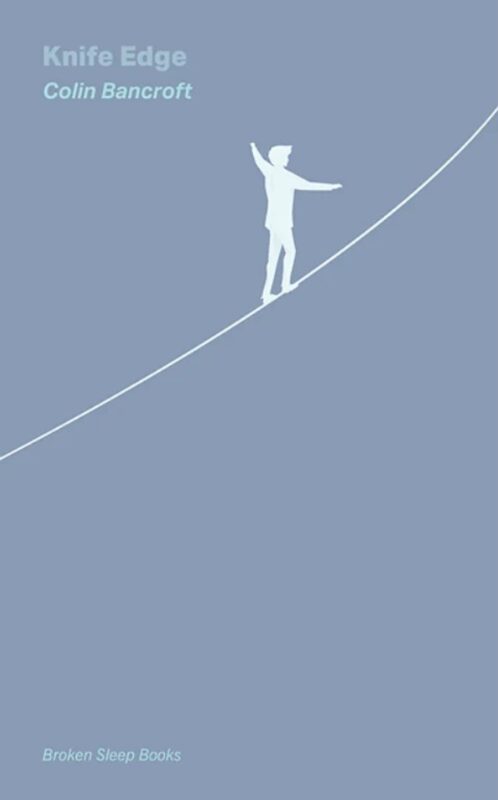REVIEW: COLIN BANCROFT’S ‘KNIFE EDGE’
By Stella Backhouse

If the title of Colin Bancroft’s 2022 pamphlet Knife Edge brings to mind a straight line and nothing else, then you’re getting only half the picture. In fact, Knife Edge is already a clever play on words, combining a reference to the unprovoked stabbing that almost ended Bancroft’s life with a metaphor for his shattered mental state in the period following. But as well as that, Knife Edge is also a sort of poetic black hole, sucking the poet’s entire identity back into a single point, whose only relevance is how it relates to the few brief seconds it took for a stranger to knife him from behind. This is a collection about a singularity that is paradoxically about a splitting.
So within its rough linearity, beginning with a description of the attack and ending four weeks later with a road trip to Aberdeen and an unexpected re-birth, are contained a variety of different perspectives, memories and associations. Some, apparently headed somewhere else entirely, need only a random shift in the weather to whip them back to the attack’s eternal present. In ‘Scar’, Bancroft enjoys a walk up a post-industrial northern hillside in the midst or reclamation by nature. Surrounded by exuberant growth, he “revelled in the regeneration./But one turn of the wind/And a switch of the waves of the grass revealed/An enormous scar running horizontally along the ridge”.
Two poems about timepieces, ‘Liutprand’ (about the putative inventor of the hourglass) and ‘Sun Dial’ are meditations on the varying speed of passing time. In the former, time escapes unstoppably after the inventor-monk accidentally cracks his glass bulb and “tried to hold the broken/Jigsaw in place, gauze over a wound./His hands, poised like mine that night,/Sealing a hole after the knife withdrew,/Feeling time/slip,/slip,/slip/through my fingers.” In ‘Sun Dial’, time stands still then suddenly lurches forwards as the seasonal ebb of midwinter light “barely cracked the floor beyond the sill./And there it will flatline for days, in stasis,/A golden thread as thin as the edge of a knife/Until suddenly something shifts it back into life”.
‘Calpurnia’, shifts the evening of the attack to the parallel time-scale of Bancroft’s still-in-ignorance partner, blithely chugging through the banal routine of a weekday evening at home: “I have never asked you what those hours were like/In that limbo as you prepared tea, watched TV,/Unwound yourself from your day./Did you know something was off?”.‘Bystander Effect’ glimpses yet another parallel universe, when shoppers in the Co-op, where the injured Bancroft sought help, “stepped over me to get to the soup tins. How strange it was,/watching those people do their shopping, showing only a/passing interest in the collapsed body on the floor”.
There are moments when confusion threatens to tip over into chaos. Rejected by death, Bancroft decides that he might as well live dangerously. In ‘Death Wish’ he again deploys imagery of sudden, inexplicable turns, speaking of the victims of mass-murderer Derrick Bird as “all those people in the wrong place at the wrong/time, that there was no design, that that might be all that life/is, just a succession of near misses, deflections of catastrophe/that can turn any way in an instant”.
Despite this, the primary image conjured by the knife edge remains one of two sides cleanly divided by a line – and throughout the collection there is a suggestion that for Bancroft, this line is art, which he uses as a way of distancing and dissociating himself from near-fatal experience. The opening poem, ‘Education at her Majesty’s Leisure’, prepares us for this possibility, when in his only reference to the otherwise-absent perpetrator, Bancroft imagines him through the oblique lens of the Shakespeare plays he might be studying in Prison Education.
Elsewhere, history, classical mythology, the poet Tennyson and Harry Potter are all brought to bear on Bancroft’s plight; in this sense, the bystander in ‘Bystander Effect’ could actually be Bancroft. But it’s poetry’s catharsis that finally triumphs: the poetic expression of joy in re-established seasonal rhythms and physical human connection together forge a bridge back over the dividing line allowing Banfcroft to fuse with himself: “A clean slate, Spring’s latest shot at life,/And you stood next to me, taking my hand,/telling me that everything would be all right”.
Knife Edge is available to purchase online, direct from publisher Broken Sleep Books, as well as other bookshops and retailers.
